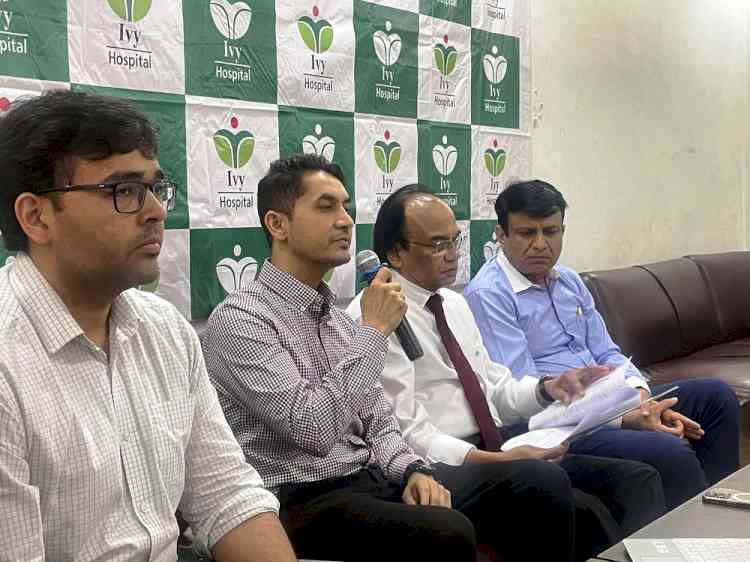PRINTING INDUSTRY OF PUNJAB NEEDS GOVT ATTENTION
Author(s): City Air NewsFrom L to R, Shri Rakesh Kumar Verma, IAS, Commissioner cum Director of Industries and Commerce, Punjab, Shri Pradeep Kumar Aggarwal, IAS; Mr. Parveen Aggarwal, President OPA; Prof. Kamal Chopra, President All India...


From L to R, Shri Rakesh Kumar Verma, IAS, Commissioner cum Director of Industries and Commerce, Punjab, Shri Pradeep Kumar Aggarwal, IAS; Mr. Parveen Aggarwal, President OPA; Prof. Kamal Chopra, President All India Federation of Master Printers and Mr. Kushl Kumar Jain, Vice President OPA.
Ludhiana April 28, 2017: During an interactive meeting with Shri Rakesh Kumar Verma, Commissioner –cum- Director of Industries and Commerce and Secretary, Information Technology, Government of Punjab Prof. Kamal Chopra presented the views and problems of the printing industry of Punjab. Team OPA lead by the President Mr. Parveen Aggarwal presented following memorandum to Shri Rakesh Kumar. Other members of team Offset Printers Association were, Mr. Kushl Kumar Jain (Vice President); Mr. Hans Raj Chopra (Finance Secretary); Mr. Amarjot Arora (Joint Secretary) and Mr. Anoop Garg (Executive Member).
Printing is the second largest industry of the world and is the biggest invention of the mankind till date. Printing is the mother of all revolution and the history of printing is the history of civilization itself. Printing literally touches every human’s life like none other. Think about the presence of printing in everyone’s life, each and every person on the planet has some element of printed product daily, from newspaper to printed toothpaste tube, printed clothes, printed label on all the household goods and above all your money. There can be houses without internet, without Tv without Radio and even some without telephone somewhere in the world, but arguably print has the presence in each and every household in the world, may be rich or poor be it developed of developing country.
Print has an unequalled history of strength – and believability. It has the power to shape ideas and influence action. It is important to note in today’s world of sound bites – of fleeting impressions – of here today gone tomorrow messages that print lasts. It is its permanence and consistency – it is its reliability that generates the power of print. No one should every underestimate this power.
Printing is nothing else than the vehicle of your ideas, since you have generated some important story again the matter how better and how fast it can reach masses and more important which vehicle can be most reliable and consistent.
Being the industrial hub, Ludhiana is known as the ‘Packaging Town’ in India. History of printing at Ludhiana goes back to first decade of 19th century, when a printing press was set up in the year 1809. Development of Ludhiana as a major industrial hub gave impetus to the expansion of printing especially packaging industry. There are more than 600 industrial units, out of which 450 are under micro and rest are in small scale sector. These units are manufacturing products like folding carton corrugated boxes, text & religious books, catalogues & price lists, labels, price tags & stickers, stationery goods, posters, greeting & wedding cards, latter pads, visiting cards and calendars etc. The printing industry of the city provides direct and indirect employment to more than 22000 persons.
Printing & packaging industry at Ludhiana is unique in a way that more than 90% units in the cluster are engage in the manufacture of printed packaging material such as corrugated cartons, cardboard boxes, labels, folding boxes etc. Only about 10% units in the cluster are doing printing job exclusively. These units either supply printed packaging material to other manufacturers or print the other items. Such as books & magazines, stationery, catalogues, account books, price lists and various types of cards etc. Specialised service providers like designers & composers doing DTP work, Pre-Press units and binding & finishing units are also there to facilitate the manufacturing units.
The local printing industry enjoys the benefits of very active and dynamic trade associations at local, national and international levels. Presently institutional support available to the printing and packaging industry is insufficient. Manufacturing processes consists of Pre-press (i.e. composition of the document or job to be printed), Corrugation of fibreboard, box manufacturing, printing with appropriate technology (Offset, Flexography, Rotogravure and Screen printing etc.) and post press (activities like embossing, foiling, die-cutting, scoring, folding pasting, stitching and bindery,).
Apart from the general problems and bottlenecks being faced by the industry not only in the city but within the entire state of Punjab the specific impediments and problems of the printing and packaging industry are:
• Raw material market is under developed. Unlike other raw material markets paper market in the region has very small number of players. Therefore market forces has modest role to play in the determination of price, resulting in leaning of terms and conditions of trade in favour of supplier and high cost of raw materials. Though the paper is declared as an essential commodity but no check is organized by the state government of its unnecessary fluctuating prices.
• Greater part of the machinery used in the cluster is imported. It is expensive; therefore individual units find it difficult to adopt latest technology. The machinery also requires higher skills to operate and it is difficult to maintain it in good repair. Some incentive for the purchase of latest machinery is required from the state government to develop Ludhiana as a hub for the global outsourced printing and packaging work.
• The facility of testing laboratory is not available in the city even within the Punjab. Therefore it is difficult to ensure the quality of raw material as well as finished and in process goods. The establishment of an authorised testing laboratory is most essential.
• The printing and packaging industry of Punjab is facing competition from neighbouring states where better incentives are available. It is also coping with the threat of cheap imports from China. Due to inadequate information on markets, the exploration of domestic market as well as Export market is inadequate. Competition among enterprises is more on price than on quality & other factors. Organised marketing channels are not available. The nature of the industry is auxiliary; therefore it is always affected by changes in the demand of principal industry. Some incentive/restriction from the state government if required to cope with the increasing competition from the neighbouring states and China.
• There is no technical training facility/Institution available in the area to train work force for the printing and packaging sector with the result technical/skilled persons are not available to run the latest sophisticated printing machines. Because of economic development, demand for labour in their home states is high; therefore the migrant labour also prefer to stay back. Consequently shortage of labour is being felt in the industry. It is anticipated that in the time to come this shortage of work force is going to affect the industry at large. It is therefore there is an urgent need for the establishment of some training facility or printing institute in the state of Punjab.
• A majority of enterprises in the city are one-man show and generally they are family owned. Their major weakness is insufficient managerial skills. Generally they could not perform better in the fields of finance, marketing and quality control. Business Development Service providers are in low demand low supply stage. There is dearth of Institutes imparting training in technical and management fields of study specific to the printing and packaging industry. This weakness is not only of printing but almost all the industries within the state of Punjab, it is therefore requested that the state government may establish a training institute for the managerial training for the owners/partners of the industrial units.
• Intellectual property Rights are the emerging issues, which the printing & packaging industry is going to deal with. The very high value software are required to run the pre-press and also the digital offset machines. The production and quality can be improved at a great extent if some support is provided by the state government for the purchase of such high value software.

 cityairnews
cityairnews 














